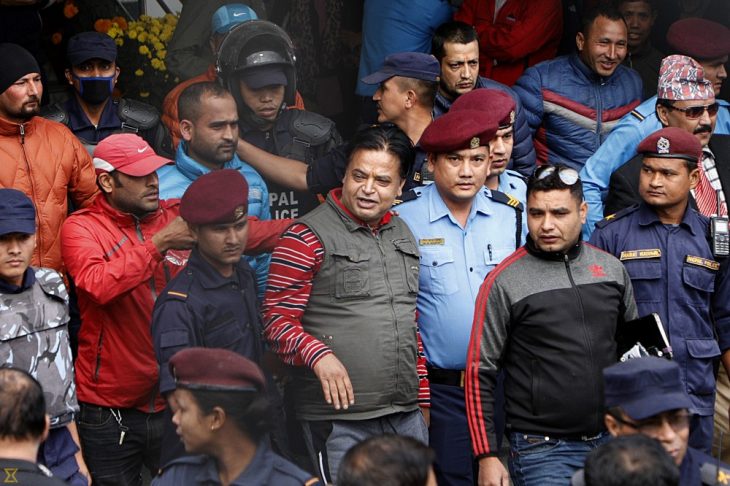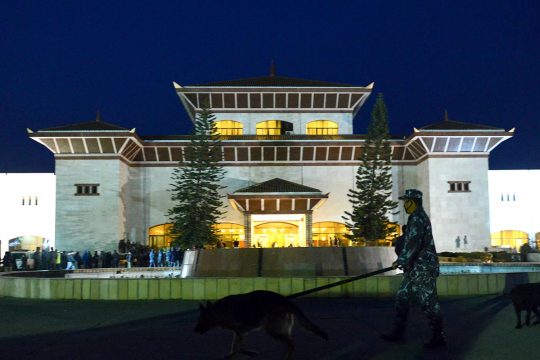In Nepal, former parliamentarian and prominent Maoist leader Bal Krishna Dhungel was arrested on October 31, 2017 in Kathmandu and sent to jail. He had been found guilty in 2004 of killing Ujjan Kumar Shrestha of Okhaldhunga district, in the eastern hills of Nepal in 1998, at the beginning of the Maoist “Peoples’ War”.
In 2004 the District Court convicted Dhungel of murder and sentenced him to life in prison with confiscation of property, but the Appeals Court cleared him in 2006. In 2010, the Supreme Court overturned the Appeals Court decision and upheld the District Court’s 2004 verdict. The Maoist Party publicly rejected the Supreme Court verdict and protected him politically, whilst the government in November 2011 recommended a presidential pardon for Dhungel. This was rejected by the Supreme Court, but Dhungel remained active in the Maoist party and free despite an existing arrest warrant. However, he has now been arrested and ordered to serve a 12½-year sentence after a contempt of court writ was filed at the Supreme Court against the country’s police chief for failing to arrest him.
The Maoist revolt in Nepal between 1996 and 2006 left thousands dead, as well as many disappeared. After the Comprehensive Peace Agreement (CPA) was signed in 2006, the Maoists joined mainstream politics, entered parliament and participated in the first Constitutional Assembly election in 2008. Dhungel ran for a seat and was elected as a Constituent Assembly (CA) member in the parliament. The Maoists formed the first elected government after the uprising.
The first CA failed to deliver a constitution, failed to deliver justice, failed to change the State structure and institutions and failed to establish truth and disappearance commissions, while victims’ concerns were sidelined. Instead of establishing transitional justice mechanisms, the criminal justice process has been overwhelmed with cases, often of a political nature. Both main parties, the Maoists and Nepali Congress, filed cases against each other and sought to divert the transitional justice debate. There are hundreds of war era cases sub-judice at various courts (district and Supreme), at the National Human Rights Commission and the UN Human Rights Committee. Following the second CA election in 2013, the political course shifted, the Maoists lost their majority and split into various factions. The radical faction led by Netra Bikram Chand (“Biplav”) is still warning the mainstream leadership, saying it has betrayed its original position of “Peoples War”. It boycotted the second CA election and is now organising against the new constitution declared in September 2015.
A culture of impunity
Due to political protectionism, court orders were not implemented, and the police couldn’t arrest convicted persons. Political parties have been defending their leaders and followers for years. Every government has defended Nepal Police and Army personnel suspected of serious human rights violations -- including murder, disappearances, torture and rape --, resulting in a deep-rooted culture of impunity. The government has failed to punish army officials convicted of Maina Sunuwar’s torture, rape and killing, and failed to investigate many conflict-related crimes. Writer and journalist Krishna Sen’s murderer Bikram Sing Thapa, who was also involved in the disappearances of Bipin Bhandari, DB Rai and many others, and Pitamber Adhikari who disappeared Tej Bahadur Bhandari still serve in senior positions in the Nepal police. Hundreds of alleged perpetrators sit in security and political institutions, and now many are contesting upcoming elections in November and December for federal and parliamentary representatives as per the new constitution. This poses a big challenge for Nepal’s democratization process and the future of justice.
Dhungel’s arrest has again polarized the political and human rights debate. The Maoist Party released a statement against the Court and Dhungel’s arrest, argued that the arrest goes against the peace process and mobilised their Young Communist League to protest against court verdicts against their leaders. Dhungel’s affiliated party in his home district also demonstrated against the court decision and his arrest. The Chand-led Communist Party of Nepal faction held a mass demonstration in Kathmandu and issued warnings to judges and politicians.
However, this arrest is an indication that Supreme Court verdicts cannot be easily flouted. Government must maintain the rule of law, listen to the people’s voices and respect the agenda for social justice. A holistic transitional justice process is a necessary step to respect victim’s rights to full investigation, truth, justice, reparation and non-repetition, for a peaceful future.






